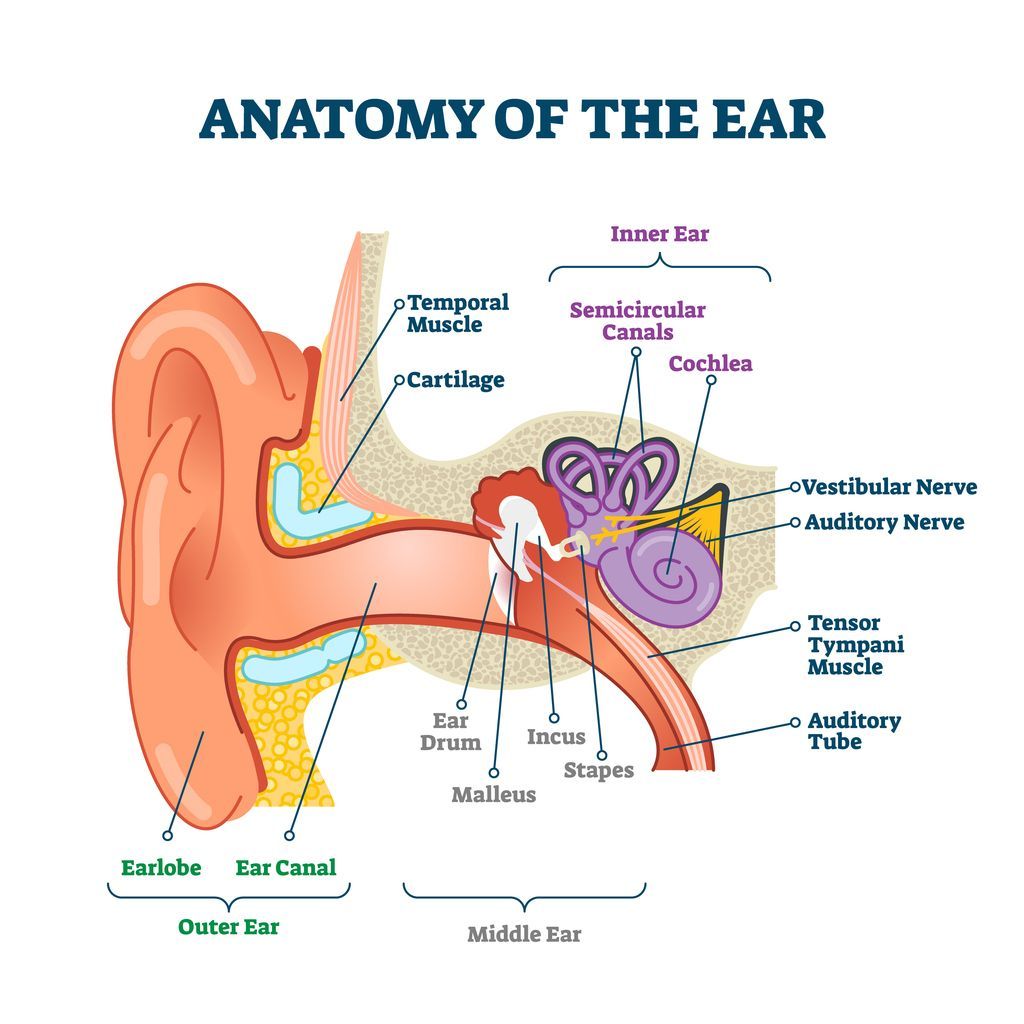Hearing Loss: What You Need to Know
Understanding how hearing loss develops, what signs to look for, and the treatments that can help you reconnect with the sounds of life.
Hearing Loss: Causes, Symptoms, and Treatment Options
Hearing loss is one of the most common health conditions in the United States, affecting people of all ages — from children and teens to adults in their 30s, 40s, 50s, and beyond. In fact, the National Institute on Deafness and Other Communication Disorders estimates that nearly 48 million Americans experience some degree of hearing loss.
For many people, it happens gradually, so the changes are subtle at first. You might simply think people are mumbling, or that background noise is making conversations harder to follow. Over time, though, untreated hearing loss can impact relationships, mental health, job performance, and overall well-being.
The good news? Hearing loss is treatable. With early detection and the right solution, you can continue to enjoy conversations, music, and everyday sounds with clarity and confidence.
Table of Contents
What is Hearing Loss?
Hearing loss occurs when one or more parts of the ear or auditory system stop working properly. This can affect how well you detect sounds, how clearly you understand speech, or both.
While hearing loss is often associated with aging, it can happen at any age due to a variety of factors — including noise exposure, illness, injury, or genetics. In many cases, people don’t realize their hearing is declining because the change is so gradual.
Why it matters: Untreated hearing loss can affect more than just your ears. Research shows strong links between hearing health and brain health, emotional well-being, and even physical safety.
At Johnson Audiology, our mission is to educate, evaluate, and empower every patient with personalized hearing solutions that fit their lifestyle, needs, and goals.

Types of Hearing Loss
Understanding what type of hearing loss you’re experiencing is the first step toward getting the right care and support.
Sensorineural Hearing Loss
This is the most common type, caused by damage to the inner ear (cochlea) or the auditory nerve. It is often permanent and may result from aging, noise exposure, or underlying medical conditions. Sensorineural hearing loss makes sounds seem unclear, even if they’re loud enough.
Conductive Hearing Loss
This type occurs when something physically blocks or disrupts the transmission of sound to the inner ear. Common causes include earwax buildup, fluid from an ear infection, or problems with the eardrum or middle ear bones. Conductive hearing loss is often temporary and treatable.
Mixed Hearing Loss
A combination of sensorineural and conductive hearing loss. This type is more complex and requires a comprehensive evaluation to determine the best treatment plan.
Symptoms of Hearing Loss
Hearing loss doesn’t usually mean total silence. More often, it shows up as difficulty understanding speech — especially when background noise is present. You may hear sounds but struggle to make out the words.
Common signs of hearing loss include:
- Frequently asking people to repeat themselves
- Feeling like others are mumbling
- Difficulty following conversations in restaurants or crowded places
- Trouble hearing on the phone
- Turning up the TV or radio louder than others prefer
- Difficulty hearing women’s or children’s voices
- Ringing, buzzing, or roaring in the ears (tinnitus)
- Feeling mentally drained after listening all day
- Withdrawing from social activities due to frustration or embarrassment
If you’re experiencing one or more of these symptoms, it’s time to schedule a professional hearing evaluation. Early diagnosis can lead to better treatment outcomes and long-term hearing health. Click here to schedule a comprehensive hearing evaluation today from the hearing experts at Johnson Audiology.
What Causes Hearing Loss?
Hearing loss can be caused by a wide range of factors, from everyday noise exposure to underlying medical issues.
Aging (Presbycusis)
Natural wear and tear on the auditory system, usually affecting both ears gradually over time.
Noise Exposure
Repeated or prolonged exposure to loud sounds — such as concerts, machinery, firearms, or earbuds at high volume — can permanently damage delicate hair cells in the inner ear.
Genetics
Family history plays a role in your likelihood of developing hearing loss, sometimes even at a younger age.
Ear Infections & Chronic Fluid
Frequent infections or fluid buildup can cause temporary or permanent hearing loss if left untreated.
Earwax Impaction
Excess wax can block sound transmission. This is often easily treatable through professional ear cleaning.
Ototoxic Medications
Certain antibiotics, chemotherapy drugs, and diuretics can damage the auditory system. Click
here to learn more about how your medications may be causing hearing loss.
Head Trauma
Sudden impact can damage ear structures or the auditory nerve.
Medical Conditions
Diseases like diabetes, heart disease, and autoimmune disorders can impair blood flow to the inner ear, affecting hearing. Click here to learn more about the connection between hearing loss and comorbidities
When to See a Doctor
Seek immediate help if you experience:
- Sudden hearing loss in one ear or both
- Rapid worsening of hearing over a short period
- Persistent tinnitus
- Ear pain, pressure, or drainage
- Hearing changes after loud noise exposure
Don’t wait —
schedule a hearing evaluation to identify the cause and begin treatment.
The Risks of Untreated Hearing Loss
Many people wait years before seeking help—often because they don’t realize how serious hearing loss can be. Unfortunately, the longer you delay treatment, the more challenging it can become to adjust to hearing aids or other solutions.
Untreated hearing loss has been linked to:
- Cognitive decline and dementia
- Increased risk of falls and injury
- Social isolation and withdrawal
- Depression and anxiety
- Strained relationships and reduced job performance
The good news? These outcomes aren’t inevitable. With early detection and professional care, you can stay connected, confident, and mentally sharp.
Comprehensive Hearing Evaluations at Johnson Audiology
Our approach begins with a comprehensive diagnostic hearing evaluation—not a quick screening. We use state-of-the-art testing to assess your hearing ability, identify the type and severity of hearing loss, and explore your communication needs.
We take the time to explain your results clearly and help you understand what options are available to you. If hearing aids are recommended, we guide you through choosing the right model for your lifestyle, comfort, and budget.
We proudly serve patients across our five locations:
Chattanooga, Hixson, Franklin, Cartersville, and Murfreesboro.
Treatment Options for Hearing Loss
Treatment depends on the type and severity of your hearing loss. At Johnson Audiology, we offer a full range of solutions including:
- Advanced digital hearing aids (including invisible, rechargeable, and Bluetooth-compatible options)
- Cochlear implants and mapping
- Custom hearing protection and musician’s monitors
- Tinnitus evaluation and therapy
- Earwax removal and ear cleaning services
We partner with trusted brands like Starkey, Oticon, Signia, Widex, ReSound, and Phonak, so you get high-quality hearing aids tailored to your hearing profile and lifestyle.
Related Hearing Health Topics
Hearing Loss & Your Career
Even mild hearing loss can impact communication, confidence, & job performance. Learn how hearing care can help you stay career-ready.
Hearing Loss & Health Conditions
Hearing loss doesn’t just affect your ears—it’s connected to diabetes, heart disease, and even depression. Understand the bigger health picture.
Hearing Loss from Music
From concerts to earbuds, loud music can lead to permanent damage. Find out how to protect your hearing while still enjoying your favorite sounds.
Hearing Loss & Brain Health
Did you know hearing loss increases the risk of cognitive decline and dementia? Learn how keeping your hearing healthy supports your brain.
FAQs About Hearing Loss
Can hearing loss be reversed?
Some types—such as those caused by earwax or ear infections—are reversible. Others, like sensorineural hearing loss, are permanent but treatable with hearing aids or cochlear implants.
At what age should I get my hearing checked?
Hearing can change at any age. We recommend adults have a baseline hearing test at age 50 (or earlier if symptoms are present), with regular follow-ups every few years.
Do hearing aids really help with hearing loss?
Yes! Today’s hearing aids are more advanced than ever, offering features like noise reduction, directional microphones, and Bluetooth streaming. Many users report significant improvements in their quality of life.
Does insurance cover hearing aids?
Coverage varies depending on your plan. We’ll help you navigate insurance, private pay options, and financing if needed. Click
here for more information about hearing aid insurance coverage.
Don’t Wait—Hear Better, Live Better
Hearing loss doesn’t have to hold you back. Whether you’re just starting to notice changes or have been living with hearing difficulties for years, now is the time to take action. Let Johnson Audiology help you hear what matters most.



